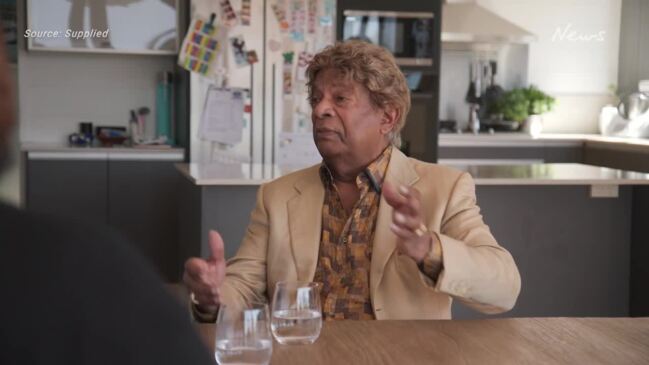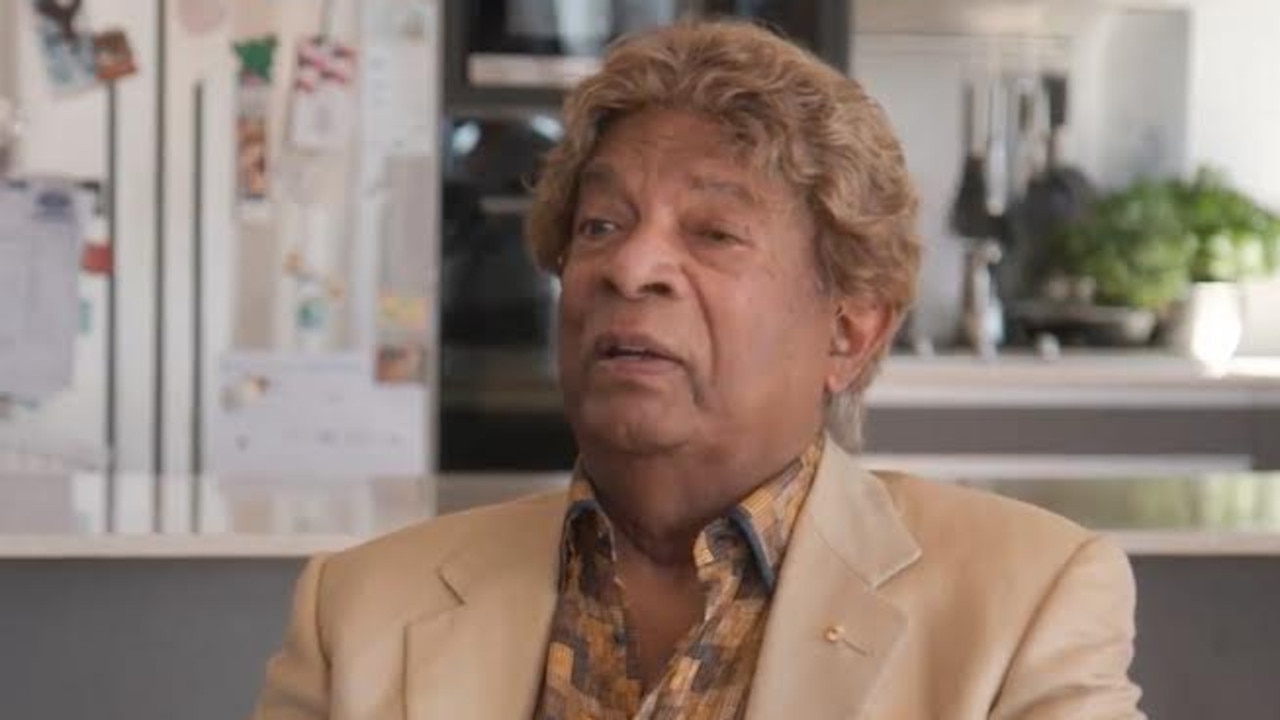Famed singer Kamahl has flipped from No to Yes on the Indigenous Voice to Parliament within the space of a month.
Writing on the social media platform X overnight, the Malaysian-born star, 88, said he had spent “sleepless nights weighing the pros and cons”.
“I will vote YES,” he wrote. “Coincidentally I was in ‘Journey out of Darkness’ in 1967 as the Aboriginal prisoner, just before THE Referendum”.
Kamahl changed his vote after meeting Indigenous comedian Dane Simpson and constitutional lawyer Eddie Synot and listening to their arguments.
“I’m embarrassed, until Monday or Tuesday I didn’t realise they (Indigenous people) were considered not human,” he said.
“I can’t …” he said, breaking down in tears. “For me, it is a heart and mind thing,” he said.
He told Simpson and Synot his “hesitancy was based on insufficient knowledge on how the whole thing works”.
He said “hopefully the right people with the right mind, heart, ability and knowledge make it a reality”.
He said he wished there was a way of a “doing it without looking like a race of people were being advantaged” but acknowledged Indigenous voices had been ignored in the political space.
“At the end of the day, I am here to help rather than hinder. If the Yes vote helps, then so be it,” he said.
“It is a positive thing to do. I don’t think I would achieve anything by voting No … if there is good I can do, I would rather do it than regret it another time.”
Just last week Kamahl told his social media followers he was voting No, admitting he didn’t understand what the Voice to Parliament actually was.
He made his previous announcement by changing the lyrics to John Farnham’s song You’re the Voice, the official song for the Yes side.
“What’s the Voice, I just don’t understand it. It’s just noise and it’s not clear. Vote no-o-oh-oh, o-o-o,” he wrote.
“We’re not going to vote Apartheid. We don’t want one race privilege. Vote no-o-oh-oh.”
He captioned the lyrics writing “I’m voting NO because I don’t understand it”.
Kamahl at the time told news.com.au there were “other priorities for Indigenous Australians” rather than the Voice.
“I don’t know what they are going to achieve out of it,” he said. “If it is so good, why is it dividing the Indigenous community?
He hit back at Aussies who say he shouldn’t have an opinion on the Voice because he is Malaysian-born, revealing he has experienced significant racism since he moved to Australia more than 70 years ago.
“Blackness is something I can’t wash away,” he said. “Despite my success there is always the feeling you are not as good as a white man.
“You always feel secondary to people as a black person in a white society.”
Kamahl said his thoughts were framed by arriving in Australia during the White Australia policy.
“I was only meant to be here temporarily,” he said. “The policy was a very real form of racism.”
The popular singer and TV star said in 2021 it “hurt” being subjected to racist jokes on the variety show Hey Hey It’s Saturday, pointing out that the same gags wouldn’t have been played out on white performers.
Appearing on Studio 10 in 2021, he said of the saga: “There is a reason why they did what they did.

“The reason is that I was successful … They couldn’t understand it … It’s a form of envy, jealousy, hate. It was their form of cutting the tall poppy down.
“It hurt, of course it hurt. It’s terrible to be humiliated. I know they wouldn’t hit John Farnham or Jimmy Barnes in the face with a powder puff, but the root of it was I was too successful for them … If I was a nobody, they wouldn’t have done anything.”
As the uproar over the resurfaced clips raged, Daryl Somers publicly apologised to Kamahl, saying the show “never set out to offend anybody” and that “all members of the Hey Hey team do not condone racism in any form”.
Last year Kamahl demanded broadcaster Phillip Adams publicly apologise for labelling him an “honorary white” after rejecting three written expressions of regret.
Kamahl has said he felt “humiliated” by Adams after the longtime ABC radio presenter claimed cricketing great Don Bradman treated the singer as an ‘honorary white’ in a since-deleted tweet.
In a widely-shared post in December, Adams contrasted Bradman’s 13-year friendship with Kamahl with his reluctance to meet former South African president Nelson Mandela.
Aussies will vote on the historic Indigenous rights referendum on October 14.
The Yes campaign will need to win four states and the national result to carry the required “double majority” for constitutional change.
Opinion polls this month suggest the proposal is headed for defeat.
Last week a poll from RedBridge marked the lowest poll result for the Yes campaign so far – with an overwhelming 61 per cent planning to vote No.
The poll was conducted in the first week of September, following Anthony Albanese’s announcement the referendum would be held on October 14.
news.com.au surveyed 50,000 Australians in July as part of the Great Aussie Debate and the results revealed the picture is even bleaker still.
Fewer than one in four people who chose to respond to the survey – which includes a host of other issues and was not specifically or explicitly about the Voice – said they supported a Voice to Parliament. Just 23 per cent.
The two strongest states – NSW and Victoria – recorded just 25 per cent and even in the dripping-wet woke ACT just 28 per cent supported it.
And tellingly the only age demographic in which support for the Voice was strongest out of the options available was 18-29 with 34 per cent in favour, which even by this former arts student’s reckoning is a fair way below 50 per cent.
Australians will be asked in the referendum: “A Proposed Law: to alter the constitution to recognise the First Peoples of Australia by establishing an Aboriginal and Torres Strait Islander Voice. Do you approve this proposed alteration?”
If a majority of Australians vote in favour of the Voice, the Constitution would be amended as follows:
1. There shall be a body, to be called the Aboriginal and Torres Strait Islander Voice.
2. The Aboriginal and Torres Strait Islander Voice may make representations to the parliament and the Executive Government of the Commonwealth on matters relating to Aboriginal and Torres Strait Islander peoples.
3. The parliament shall, subject to this Constitution, have power to make laws with respect to matters relating to the Aboriginal and Torres Strait Islander Voice, including its composition, functions powers and procedures.
carla.mascarenhas@news.com.au

